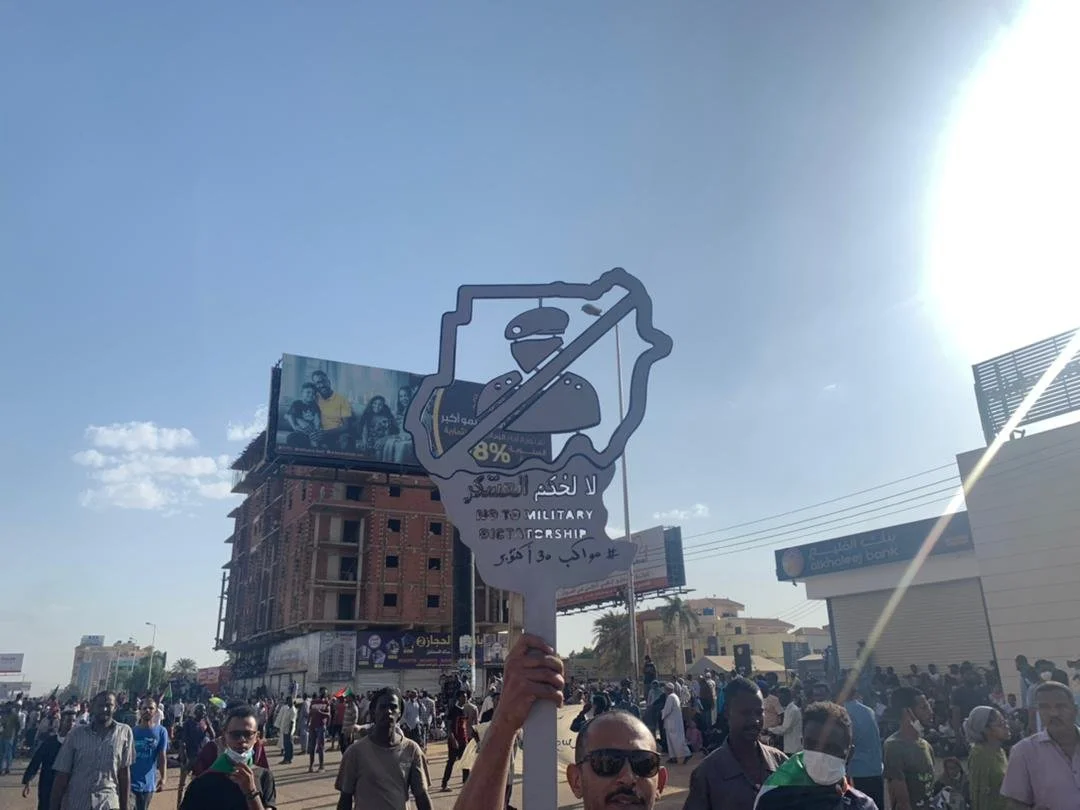The roots of the Sudan coup lie in the failure to ensure an inclusive and democratic transition
Photo from the anti-coup protests circulating on WhatsApp
The coup against Sudan’s transition to democracy highlights the historical and ongoing failure to properly respect the rights of Sudanese women.
Sudanese women were the heart of the uprising against the Bashir regime that started nearly three years ago. Their leadership made them global icons of the revolution, but when the transition began, women’s involvement was to become purely superficial.
Women’s groups such as MANSAM demanded that Sudanese women participate as equals in the transition. Instead of building on the remarkable legacy of Sudanese women’s movements and the many brilliant women leaders of the past, these demands for parity were ignored.
This was one of many compromises made with the very people who have now tried to derail the transition entirely.
The coup is also another legacy of the years of abuse and corruption under the Bashir regime. Under his brutal and vicious leadership, state institutions were left to rot, while every effort was made to disempower women legally, politically, socially and economically.
These years have instituted a political culture that is deeply hostile to women, that resists their participation, as well as state institutions that were too weak to maintain and sustain the transition.
Addressing these weaknesses must be priorities if Sudan is to ever transition to democracy.
Members of the transition - both civilian and military - did not take women’s participation seriously, rather they excluded and marginalized women, while the international community was happy to simply fetishize Sudanese women as symbols of revolution, rather than recognizing the complexity of their identities and agency within Sudan and the uprising.
There has never been enough effort taken to realize the right of Sudanese women to participate meaningfully in the transition and governance of their country.
In the wake of the coup, there have been important statements of condemnation made by international governments. But these have to be read in the context of the policies many of these governments have so far pursued on Sudan.
International governments have been happy to work with figures from the military who have already been responsible for appalling human rights violations and profound corruption. The EU and European governments especially have been prepared to increase the power and influence of militias where they perceive their interests align. These governments have treated the ongoing crisis in the Mediterranean as a security issue - rather than a humanitarian, social and political issue - and have therefor sought cooperation with security forces. In Sudan and elsewhere, these allies have long histories of committing human rights violations.
One of the key lessons of this coup is that the military leadership is not a good faith actor in Sudan. Peace, security and democracy are threats to this leadership, so compromise with them will only subvert the achievement of these goals.
The recent exhortations to human rights will ring hollow if the international community follows this outrage by continuing to support individuals who have committed atrocity after atrocity.
Ultimately it is the women and youth of Sudan who will suffer disproportionately in the chaos and crisis caused by decision-making processes that have marginalized or excluded them entirely.
There can be no peace, security or justice without accountability. So we demand that there finally be accountability for the atrocities committed under the Bashir regime, accountability for the Khartoum Massacre of 2019, and accountability for the perpetrators of Monday’s coup.
Solidarity with the people of Sudan.

